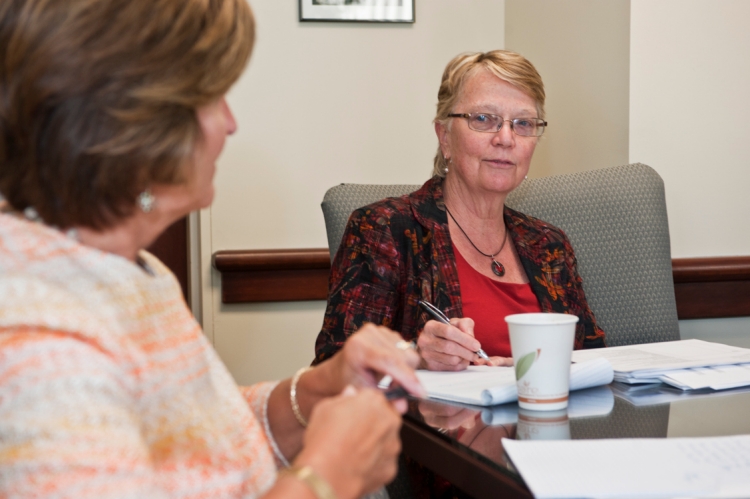
By
The Lynch School of Education, the nation’s leading Catholic school of education, is poised for a year of strategic planning across areas of research, service and professional training in education and applied psychology, according to Interim Dean Maureen Kenny.
“The Lynch School of Education faculty and staff are spending time as a unit looking at our goals and aspirations over the next five to 10 years and how we go about getting there,” said Kenny. “We also need to look at the external forces that shape education and social policy because they influence what we do and where we are going.”
Kenny and the Lynch School will also be using several symposia to connect with national thought leaders in the areas of education research, policy and practice. Kenny and Professors Marilyn Cochran-Smith and Dennis Shirley are hosting the symposium “Education and Its Role in Democratic Societies” throughout the day tomorrow.
Kenny said it’s important to constantly review the school’s strategic approach to carrying out its mission of enhancing the life chances of children, college students, and families through education and applied psychology.
“I think the Lynch School has a clear view of its mission,” said Kenny, who joined the school in 1988. “But we need to revisit that mission and make operational our view of social justice, and know how well we are doing. We’re always looking to enhance our accomplishments and level of achievement and to position the school to best meet the challenges of the future.”
Kenny said the Lynch School’s 682 undergraduate students and 1,003 graduate students benefit from approximately 58 full-time faculty who are nationally and internationally known researchers, dedicated teachers and deeply committed to service. Representing just eight percent of the University faculty, the Lynch School generates 25 percent of the University’s sponsored research.
While rancorous debates over standardized testing, teacher pay and performance evaluation continue to make headlines, Kenny is bullish on the future for professional educators.
“It is an excellent time to become a teacher,” said Kenny. “From our data, there are job opportunities and students who graduate with teaching credentials have had great success gaining employment, particularly in the areas of high need, like science, math, special education and the instruction of English Language Learners.” Furthermore, all Lynch School undergraduate students in secondary education also pursue a major within the College of Arts and Sciences.
A counseling psychologist, Kenny has served in a variety of leadership positions in the school, including associate dean of faculty and academic affairs, chair of the Department of Counseling, Developmental and Educational Psychology and director of the American Psychological Association (APA)-approved doctoral program in counseling psychology.
It’s that kind of experience that made Kenny a natural choice to lead the school while the University searches for a replacement for former Dean Joseph O’Keefe, SJ, who has returned to teaching and research.
“As a colleague, Maureen is a major star within the world of counseling and prevention,” said Professor of Counseling, Developmental, and Educational Psychology David Blustein. “She is one of the top scholars who is examining the interface of career development and school engagement. There is a huge concern that students – particularly those who are from at-risk contexts – are not optimally engaged in school. Maureen has led original research and developed programs focused on how we can better engage students in school; how we can get them to buy in.”
Blustein, who began collaborating with Kenny in the late 1990s, cited as an example the Tools for Tomorrow program, which he and Kenny developed in collaboration with colleagues from BC and Boston Public School officials. The program not only created a model approach to increase school engagement for at-risk students, but also produced research that has been cited repeatedly by others in the field.
That kind of experience, rooted in both research and the real schools, has helped to inform Kenny’s leadership style, he said.
“It is incredibly important to have a person with that kind of experience in a leadership position because she brings a background in the disciplines of education and psychology, which are at the heart of the Lynch School. We’re lucky to have a cutting-edge scholar who is also a gifted and inspired leader.”
Even though she is charged with leading the school, Kenny continues to maintain a robust research and service portfolio. Her work has focused on fostering engagement in urban schools and identifying the barriers to academic success that students perceive. Recent work has examined the value of workplace supervisors as mentors to high school students in work-based learning placements.
“I’m interested in how teachers, administrators and policy makers can foster academic motivation among urban high school youth,” said Kenny. “And how to address the barriers that impede school engagement.”
The APA honored Kenny in 2009 with a lifetime achievement award. Her latest research took her to Italy and produced a recent portrait of school engagement and career development among Italian teens. She also spent nearly two months at an orphanage in Tanzania that serves children who have lost their parents to AIDS. Accompanied by her husband and daughter on the service trip, Kenny worked with the children and also examined the curriculum and services offered by the remote educational outpost.
Kenny said she draws on the energy and talents of her colleagues on the faculty and the administrative team that supports the school’s many initiatives.
“The Lynch School benefits from a wealth of energy and vitality within our faculty and our staff,” said Kenny. “We direct that energy into our clear mission. When we hire faculty, it is with the intent that they are going to participate fully in that mission through teaching, research, and service.”



